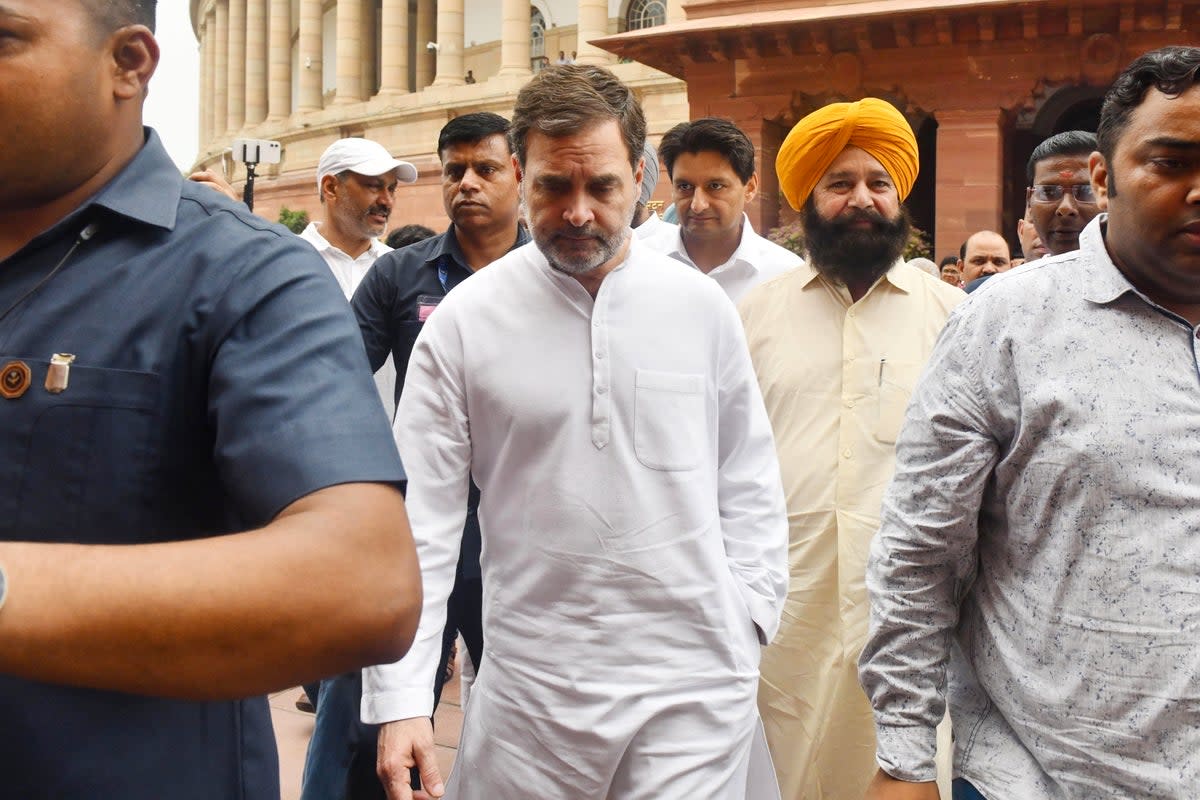Indian opposition leader sparks protests with remarks attacking ruling party in parliament

Rahul Gandhi’s maiden speech as the leader of opposition in parliament sparked protests after he tore into Narendra Modi’s ruling Bharatiya Janata Party (BJP), accusing it of perpetuating violence and hate in India.
His effigies were burnt in the prime minister’s constituency of Varanasi and neighbouring city of Prayagraj, as protesters chanted slogans demanding “Rahul Gandhi [to] come to sense”, reported the Times of India.
Mr Gandhi, who attended parliament armed with a copy of India’s constitution and a picture of Hindu deity Lord Shiva, launched a scathing attack on the BJP and its ideological mentor, Rashtriya Swayamsevak Sangh (RSS), on Monday, accusing them of systematically deflecting attention from issues of inflation, job crisis, and income inequality.
“Those who call themselves Hindus… are engaged in violence and hate,” Mr Gandhi said, in a now partially expunged speech, sparking a sharp intervention from Mr Modi as dramatic scenes unfolded in Lok Sabha, the lower house of parliament.
Besides the prime minister, several ministers from Mr Modi’s cabinet, including federal home minister Amit Shah, interrupted Mr Gandhi’s speech and demanded an apology from him. “There are so many people who call themselves Hindu with pride, and those who had imposed emergency and led the anti-Sikh riots in 1984 have no right to blame others for spreading an environment of fear,” he said.
The parliamentarians from the BJP hooted Mr Gandhi with chants of “Jai Shri Ram” (Hail Lord Ram) and “Bharat Mata ki Jai” (glory to mother India).
However, the leader of opposition received support from parliamentarians of opposition INDIA alliance led by the Congress, who chanted “Jai Samvidhan”, hailing the Indian constitution.
Mr Gandhi went on to defend his remarks saying he was talking specifically about BJP and the ruling party was not the sole representative of Hinduism. He accused the party of not following the essential tenets of the religion, reported the Indian Express. In his nearly 100-minute-long speech, he also accused the right-wing party of spreading hate and violence against minorities, creating an atmosphere of fear, curbing dissent, and targetting politicians from opposition.
Holding up pictures of Lord Shiva, Guru Nanak, and Jesus Christ, Mr Gandhi referred to Hinduism, Islam, Sikhism, Christianity, Buddhism and Jainism to underline the importance of fearlessness rooted in different religions, while taking a dig at the Hindu-right wing ecosystem.
Invoking virtues of the widely revered Hindu deity, Mr Gandhi said: “Lord Shiva says do not be fearful…he buries the trident in the ground and those who call themselves Hindus, they chant violence, hatred, untruth…You are not a Hindu.”
His comments have drawn sharp criticism outside parliament.
“It is unfortunate that people holding important positions in parliament are associating Hindutva with violence,” said senior RSS functionary, Sunil Ambedkar. “Whether Vivekananda or Gandhi... Hindutva is a symbol of harmony and brotherhood.”
“First day, worst show!” said BJP National president Jagat Prakash Nadda. “Lies + Hatred= Rahul Gandhi in parliament,” he wrote on X. Referring to him as a “third time failed leader of opposition” – for the Congress’s three successive losses against BJP in general election – he said Mr Gandhi “has a knack for agitated, flawed logic”.
First day, worst show!
Lies + Hindu hatred = Rahul Gandhi Ji in Parliament.
Third Time Fail LoP has a knack for agitated, flawed logic. His speech today has shown that neither has he understood the mandate of 2024 (his third successive loss) nor does he have any humility.— Jagat Prakash Nadda (@JPNadda) July 1, 2024
“His speech…has shown that neither has he understood the mandate of 2024, nor does he have any humility.”
Amid protests and backlash, Mr Gandhi stood by his statement, which for large parts have been expunged from parliament’s record. "In Modi ji’s world, truth can be expunged. But in reality, the truth can’t be expunged. I said what I had to say, that is the truth. They can expunge as much as they want. Truth is truth.”
He has also written to house speaker Om Birla, raising concerns about the “manner in which a considerable portion of my speech has been simply taken off from the proceedings under the garb of expunction”.
“What I sought to convey in the House is ground reality, the factual position. Every member of the House who personifies the collective voice of people whom he or she represents has the freedom of speech” as enshrined under the Constitution of India, he said.
“Taking off from records my considered remarks goes against the very tenets of parliamentary democracy.”


